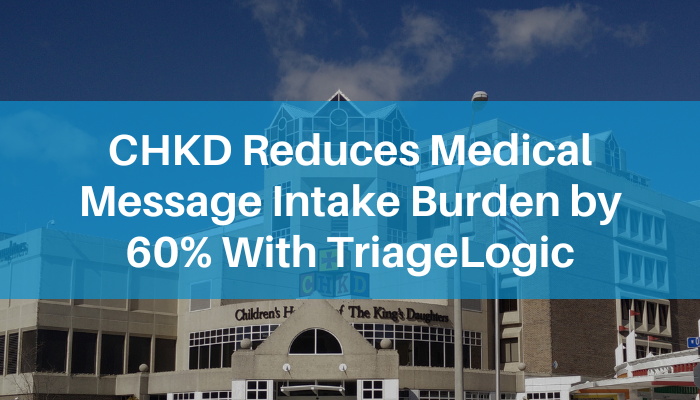JACKSONVILLE, FL / ACCESS Newswire / July 29, 2025 / In early 2025, a leading pediatric health system in Virginia took a bold step toward modernizing patient access - one that's already reshaping their operations and improving satisfaction across the board. Hampton Roads Pediatrics, part of the Children's Hospital of The King's Daughters (CHKD) Medical Group, had been struggling with call volume and staffing limitations. Within weeks of implementing TriageLogic's MedMessage Automate, over 60% of patient messages were being submitted through self-service - dramatically reducing the burden on their front desk team. Those submissions not only included accurate and relevant information, but were also automatically routed to the appropriate staff members, ensuring faster response times and better patient outcomes.

Children's Hospital of The King's Daughters.
The Challenge: Manual Intake Meets Modern Demands
CHKD had relied heavily on a phone-based intake system, where parents were required to wait on hold to submit their children's medical requests. Staff members then manually transcribed and routed those requests to the appropriate clinical teams. This traditional approach placed a growing burden on nonclinical operators at their front desk, particularly during periods of high call volume. It led to long wait times, delays in handling urgent messages, and increased administrative pressures.
On top of these concerns, CHKD was also facing a simultaneous rise in operational costs and shortage of available personnel, making it even more difficult to train and maintain a responsive intake team.
The Solution: Self-Service Intake
To meet these demands, Hampton Roads Pediatrics partnered with TriageLogic to implement a platform called MedMessage Automate that patients could use to submit their symptom data directly to the nursing team.
Here's what that process looks like.
When a parent contacts the office, they receive a secure text link from MedMessage Automate that prompts them to complete a short medical intake form. Using a proprietary algorithm, this smart form adapts to the patient's request or response. For example, if a child has a reported fever, the system asks follow-up questions about the severity and duration of that fever in order to collect clinically relevant details. This data is then automatically routed to the appropriate triage nurse queue, eliminating the need for staff to manually collect, transcribe, or enter intake information into their system.
Because this platform was designed to integrate seamlessly with existing triage workflows like this hospital's, the transition required minimal training and caused no disruption to daily operations.
Initial Results
Between March 18 and May 6, Hampton Roads Pediatrics was able to divert 60% of its patient call requests to this automated service. Not only did this lead to a notable increase in intake accuracy, but it also saved the hospital 3-7 minutes of human capital per interaction.
Click here for additional results and to see how patients felt about using this platform.
Why It Matters
CHKD's experience demonstrates how augmented intelligence like MedMessage Automate can reduce administrative overhead, support clinical teams, and deliver better health outcomes.
Healthcare organizations that are interested in seeing similar results are encouraged to contact TriageLogic.
Contact Information
Kristina Barry
Product Specialist
kristina.barry@triagelogic.com
800-723-4290
SOURCE: TriageLogic
View the original press release on ACCESS Newswire:
https://www.accessnewswire.com/newsroom/en/healthcare-and-pharmaceutical/chkd-reduces-medical-message-intake-burden-by-60-with-triagelogic-1035163
